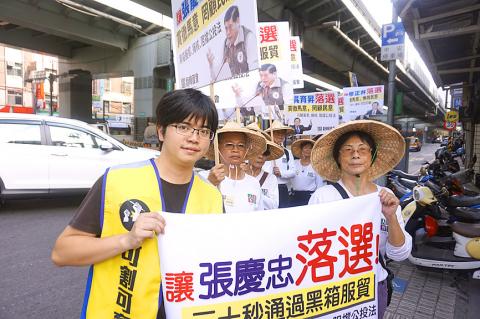A group of activist organizations yesterday established a “Headquarters for Voting Out Candidates” (落選總部) in New Taipei City, announcing Chinese Nationalist Party (KMT) legislative candidates Liao Cheng-ching (廖正井), Chang Ching-chung (張慶忠) and Wu Yu-sheng (吳育昇) as their primary targets.
The headquarters — on Jingping Road in the city’s Jhonghe District (中和) — was jointly founded by four activist groups, including The People Rule, the Taiwan March, the Appendectomy Project and the Congressional Investigation Corps.
“Last year’s Appendectomy Project recall campaign, which was aimed at ousting unqualified legislators, successfully prompted the second recall referendum in the nation’s history,” Appendectomy Project spokesperson Lin Zu-yi (林祖儀) said at the headquarters’ launch ceremony.

Photo: Chang An-chiao, Taipei Times
Lin was referring to a landmark recall referendum launched in February last year against KMT Legislator Alex Tsai (蔡正元), which failed to attain the required 50 percent voter turnout.
Lin said that while the campaign yielded only limited results due to the strict regulations set out in the Referendum Act (公民投票法) and the Civil Servants Election and Recall Act (公職人員選舉罷免法), they stepped up their efforts and launched the “Voting Out Candidates Movement” last month to make voters aware of the reprehensible conduct by some legislative candidates in the Jan. 16 elections.
The movement targets Liao, Chang and Wu — all of whom are seeking re-election in the January race — because they were chosen as the three worst incumbent lawmakers in various surveys conducted by non-governmental organizations, Lin said.
They have adopted measures such as having hundreds of volunteers on weekends distribute flyers detailing why the trio deserve to be voted out in their respective constituencies, Lin added.
According to the movement’s Web site, Liao is most notorious for his proposal to raise the already high thresholds for recalls, as well as his conduct in May last year when he threatened to delay the legislative review of the Judicial Yuan’s budget proposals if it did not expedite the trial against Taipei MRT killer Cheng Chieh (鄭捷).
According to the site, Chang should be voted out of the legislature over his move to rush the controversial cross-strait service trade agreement through a legislative committee review in March last year, and his stance against lowering the recall thresholds and the suspension of construction of the nation’s controversial fourth nuclear reactor.
The site said Wu’s censurable conduct includes his support for media monopolization and imports of US beef, as well as his obstructions of proposed amendments to the Referendum Act and the Assembly and Parade Act (集會遊行法).
Taiwan March Foundation head Chen Hui-min (陳惠敏) said in addition to the movement they have also demanded that legislative candidates sign an affidavit pledging to push for reforms to the Referendum Act and the Civil Servants Election and Recall Act.

Alain Robert, known as the "French Spider-Man," praised Alex Honnold as exceptionally well-prepared after the US climber completed a free solo ascent of Taipei 101 yesterday. Robert said Honnold's ascent of the 508m-tall skyscraper in just more than one-and-a-half hours without using safety ropes or equipment was a remarkable achievement. "This is my life," he said in an interview conducted in French, adding that he liked the feeling of being "on the edge of danger." The 63-year-old Frenchman climbed Taipei 101 using ropes in December 2004, taking about four hours to reach the top. On a one-to-10 scale of difficulty, Robert said Taipei 101

Nipah virus infection is to be officially listed as a category 5 notifiable infectious disease in Taiwan in March, while clinical treatment guidelines are being formulated, the Centers for Disease Control (CDC) said yesterday. With Nipah infections being reported in other countries and considering its relatively high fatality rate, the centers on Jan. 16 announced that it would be listed as a notifiable infectious disease to bolster the nation’s systematic early warning system and increase public awareness, the CDC said. Bangladesh reported four fatal cases last year in separate districts, with three linked to raw date palm sap consumption, CDC Epidemic Intelligence

Two Taiwanese prosecutors were questioned by Chinese security personnel at their hotel during a trip to China’s Henan Province this month, the Mainland Affairs Council (MAC) said yesterday. The officers had personal information on the prosecutors, including “when they were assigned to their posts, their work locations and job titles,” MAC Deputy Minister and spokesman Liang Wen-chieh (梁文傑) said. On top of asking about their agencies and positions, the officers also questioned the prosecutors about the Cross-Strait Joint Crime-Fighting and Judicial Mutual Assistance Agreement, a pact that serves as the framework for Taiwan-China cooperation on combating crime and providing judicial assistance, Liang

US climber Alex Honnold left Taiwan this morning a day after completing a free-solo ascent of Taipei 101, a feat that drew cheers from onlookers and gained widespread international attention. Honnold yesterday scaled the 101-story skyscraper without a rope or safety harness. The climb — the highest urban free-solo ascent ever attempted — took just more than 90 minutes and was streamed live on Netflix. It was covered by major international news outlets including CNN, the New York Times, the Guardian and the Wall Street Journal. As Honnold prepared to leave Taiwan today, he attracted a crowd when he and his wife, Sanni,